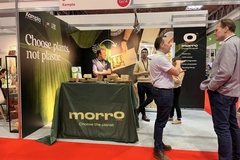
- Industry news
Industry news
- Category news
- Reports
- Key trends
- Multimedia
Multimedia
- Journal
- Events
- Suppliers
- Home
- Industry news
Industry news
- Category news
- Reports
- Key trends
- Multimedia
Multimedia
- Events
- Suppliers
Sanitary sustainability: Mondi fights plastic pollution in baby products with paper-based innovation

27 Jan 2023 --- Baby and toddler packaging for F&B, hygiene and pharmaceutical products is a key segment for the industry, with concerns over cleanliness, safety and reusability abounding for one of society’s most vulnerable consumer groups.
Stakeholders face the challenge of assuring parents and guardians that products are safe and meet the growing demand for environmental sustainability. Global market analyst Innova Market Insights notes that baby and toddler F&B launches are decreasing globally, featuring a -15% year-over-year decline over the past three years.
From 2021 to 2022, Folded Box (21%) was the leading packaging format for the tracked baby & toddler launches. Meanwhile, plastic (41%) was the leading packaging material for the tracked launches. The top environmental sustainability-related claim among global baby and toddler product launches tracked in 2021 and 2022 was “recyclable” (53%).

Some industry players are responding to these demands with innovations that answer the demand for recyclability while reducing plastic consumption. This trend applies not only to F&B launches but also to other sanitary products, such as diapers.
“As in many other industries and end markets, we see a clear consumer preference toward paper packaging for diapers,” Judith Wronn, senior communications manager at Mondi, tells PackagingInsights.
“Following our approach of using ‘paper where possible, plastic when useful’ and by closely collaborating with our customers, we try to understand the needs of the consumers, the brands and the products. With our EcoSolutions approach, we help our customers to achieve their sustainability goals.”
 An example of the EcoWicketBag by Mondi.Transitions in diapers
An example of the EcoWicketBag by Mondi.Transitions in diapers
Mondi’s EcoSolutions approach is a collaborative method employed by the Austrian company. “It means that in partnership, we can all work together to create the best possible packaging solutions for our customers, consumers and the environment,” explains Claudio Fedalto, COO for Mondi Paper Bags.
“We focus on being sustainable by design, thinking not just about materials we use but taking a broad approach to sustainable systems and circular economies.”
For baby and toddler packaging, Mondi has extended EcoSolutions to the packaging of diapers – a controversial segment for the industry. Previous studies have shown that disposable diapers are the third largest single consumer item in landfills in the US and Western Europe, representing about 4% of solid waste.
According to the same studies, in homes with a child requiring diapers, disposables make up 50% of household waste. Disposable diapers generate 60 times more solid waste and use 20 times more raw materials, like crude oil and wood pulp.
The manufacture and use of disposable diapers amount to 2.3 times more water wasted than cloth. Over 300 pounds of wood, 50 pounds of petroleum feedstocks and 20 pounds of chlorine are used to produce disposable diapers for one baby each year. Disposable diapers often contain traces of dioxin, a highly toxic by-product of the paper-bleaching process. It is a carcinogenic chemical, reportedly the most toxic of all cancer-linked chemicals.
The EcoWicket bagTraditional plastic-based diapers cause a serious threat to human and environmental health, according to research.Mondi has developed an innovative solution that allows diaper producers to transition from plastic to paper packaging. The product is branded EcoWicketBag and provides safe packaging for a range of hygiene products, from diapers for babies and adults and female hygiene products to toilet and kitchen tissues.
“We combined our knowledge of kraft paper and our bag-making expertise to rethink the whole packing process. Using our customer-centric EcoSolutions approach, we worked closely with our customer along every step of the journey,” says Wronn.
“The result is an appealing design that meets our customer’s sustainability goals. Not only did we replace the plastic wicket bags with a paper-based solution, little to no adjustments are needed to run the paper bags on traditional filling equipment.”
The company says that switching from plastic to paper EcoWicketBag may not require any adaptation of the filling equipment. In cases where an adaptation is needed, the company collaborates closely with major manufacturers to develop machine parts that can be added onto the existing machine, allowing a “smooth and efficient filling.”
Paper solutions
The central design features that make the EcoWicketBag superior to alternatives are the following, Wronn explains:
- It is made of extremely durable kraft paper.
- The strong paper ensures the bag holds up during the filling process, protects the products inside and is still recyclable after use.
- It keeps products sterile and safe.
- It meets all hygiene standards, ensuring the long shelf life of the products and preventing quality issues.
- Cuts CO2 emissions significantly.
- Depending on its construction, EcoWicketBag can significantly reduce the CO2 emissions of LDPE wicket bags and be recyclable in paper streams.
- EcoWicketBag meets the strictest regulations for waste paper collection.
For the past three years, Mondi has provided DryLock Technologies – a leading private-label hygiene products manufacturer, with the EcoWicketBag.
“We approached Mondi because of their expertise in paper packaging and their extensive knowledge of the global hygiene market. Consumers are looking for more [environmentally] sustainable packaging that is kinder to the planet without compromising on the integrity of the product,” says Werner Van Ingelgem, R&D director at Drylock Technologies.
By Louis Gore-Langton











